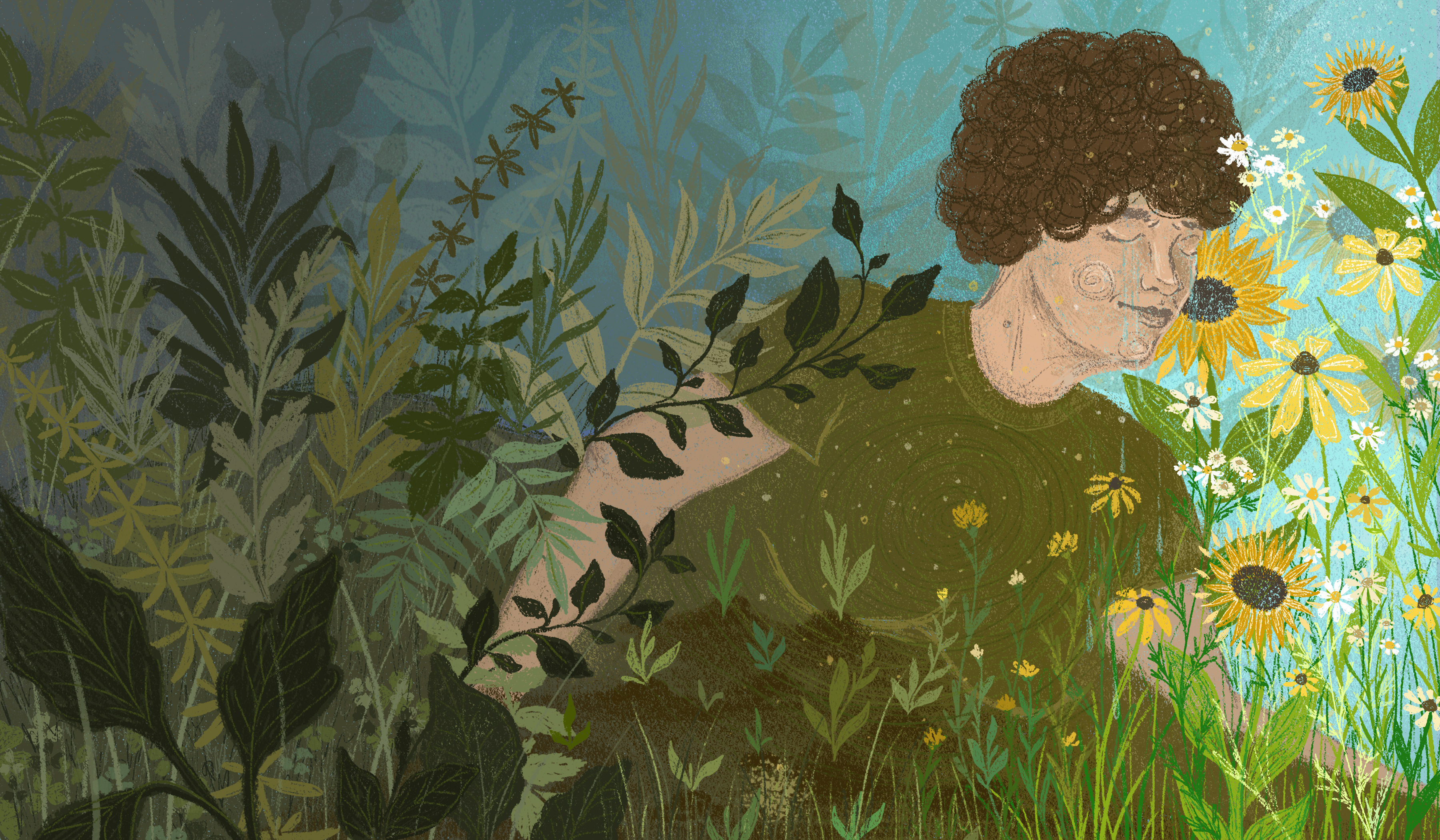
#MeToo and the Spiritual Struggle for Gratitude
Image by Rachael Amber, © All Rights Reserved.
About two hours outside of Lexington, Kentucky sits a small church on a country road — a white clapboard building surrounded by fields and woods, mountains in the distance. A cemetery surrounds it, too, holding saints in the earth awaiting resurrection.
I have never been to this particular church. I have seen it online. However, I never want to visit in person, for somewhere in that graveyard, resting among the faithful, lay the remains of the uncle who abused me when I was fourteen years old. When my mother sent me an email in January 2007 saying he was dead, I replied, “Thank God.” It was the first time that any mention of my uncle and a word of gratitude ever combined in a sentence. Occasionally, I check the graveyard on the internet — wanting, I think, to assure myself that he is still in the dirt.
I looked again recently, after the news of Bill Cosby’s conviction and Harvey Weinstein’s indictment. Yes, my uncle is still buried. But the ghosts linger. Even today, news stories of abuse wind my emotional clock back 45 years, and I find myself shaking again like a teenage girl. I am 59 now, and I have struggled with a lifetime of consequences. Over the years, there has been anger and pain, but there has also been release and healing.
One thing, however, has remained particularly troublesome: the spiritual fallout of sexual abuse. As a teenager, my search for freedom from the pain led me to a fundamentalist church, a community of clear-cut rules and gender roles, with rigid boundaries, a place where I thought no one could hurt me again. Although I did not fully comprehend it at the time, its spiritual safety came with a price — the requirements of forgiveness and a cheerful piety of gratitude.
The church taught me that forgiveness and gratitude were intimately connected. Having now written a book on gratitude, I know that research shows this is actually correct. Forgiveness clears our lives of negative emotions, allowing space for positive emotions — like gratitude — to enable healing. That church however, got something dangerously wrong. They failed to realize that forgiveness was a process to work through anger, grief, and confusion. Instead, they attributed “bad” emotions to “Satan”: They pushed victimized people toward immediate forgiveness and thanksgiving, the “good” emotions they believed proved one’s salvation.
Forgiveness and gratitude are essential to healing, and they are, indeed, qualities of a mature spiritual life. Miraculous, even. But not all miracles are instantaneous. Coercing those who have been abused to forgive and give thanks reinforces the trauma, undermining genuine healing with misguided theology and perverse understandings of God and human nature.
As a young church member and then as a student at an evangelical college, I faked it. I pretended to forgive. I mimicked thanks: in prayers, in praise songs, in testimonies. But I was full of pain — even as I wanted to be joyful and grateful — spiritually lost between what was expected of me and what was true.
Interestingly enough, some of the research around gratitude fosters a similar spiritual misunderstanding. Scientists have discovered that negative emotions — fear, anger, greed, and regret — block gratitude, causing “self-alienation,” broken relationships, and unhappiness that result in “a distortion of reality.” Not quite “Satan,” but pretty close.
At the same time, “grateful people tend to be satisfied with what they have” and are less likely to succumb to negative emotions. It is a bit of a theological and therapeutic gerbil-wheel — positive people are grateful and grateful people are positive. Negative people are ingrates and ingrates sink into a mire of maladjustment. The trick, whether through salvation or positive psychology, is to get rid of your negative emotions.
This is where I felt stuck: The fear was real, and it was not my fault. How to get rid of something you neither created nor deserved? What if you are afraid because your room was not safe at night? What if you are angry because no one was protected you from harm? What if you mourn the loss of your sense of personhood? These are not just “negative” emotions. They are genuine feelings induced by trauma. They are natural responses when pain is inflicted on you — how much worse would it be if a victim did not feel fear, anger, and grief?
For those of us who have bravely said #metoo, gratitude can be difficult, especially if we sought refuge in religious communities that reinforced shame under the guise of salvation.
A classmate from my evangelical college days had a poster hanging — in of all places — above the toilet in her bathroom. It depicted a cheerful garden, and was emblazoned with words from the biblical book of Thessalonians:
Rejoice always
pray without ceasing
give thanks in all circumstances;
for this is the will of God
in Christ Jesus for you.
I wanted to rip it off the wall. I was full of fury at injustice, not only what I had suffered, but at even larger evils endured by people less fortunate than even my own sorry self. But I knew that such an emotional insurrection would lead others to believe that I was possessed by the devil. So there it remained taunting me, every time I had to relieve myself.
“It is worth noting,” reports one gratitude study, in detached jargon, “that while gratitude is considered a positive psychological factor, it is not necessarily good for all people under all circumstances, e.g., displaced gratitude under conditions of exploitation.” No kidding. Put that on a poster, girlfriend. Telling victims to “get over it” and to be grateful for being wronged only wounds the suffering and empowers perpetrators. Sometimes feeling thankful just has to wait. Gratitude can and should never be forced or faked. And it is never appropriate to cover-up or deny abuse or excuse injustice.
Our lives are an intricate mix of feelings, created through myriad circumstances, many of which are beyond our control. Some of our problems arise when we judge or fear our own emotions. One of the most helpful teachings in Buddhism is the idea that suffering simply exists — that it is intensified by human refusal to acknowledge the reality of pain. Suffering actually increases when we resist, deny, or fear negative emotions, and those emotions often cause shame. Shame blocks gratitude. As human beings, part of our job is to be able to recognize what causes pain, to work toward healing, and to learn how to live in the world with empathy, forgiveness, and gratitude. Embracing our humanness, with its mixture of sadness and joy, fosters vulnerability and authenticity, and takes us toward maturity and deep love. “Gratitude,” writes Catholic theologian Mary Jo Leddy, “does not dispel the mystery of suffering and evil in the world and may even deepen it.”
Living into the mysteries of pain, injustice, illness, and violence is difficult. We humans rightly rage against these indignities, everything that works against joy, love, and peace. For decades, I wrestled with shame regarding my uncle. Those emotions were exacerbated by other incidents where I was rejected, hurt, or felt violated. The negative feelings — especially the struggle to trust, emotional defensiveness, and wrestling with profound self-doubt — were powerful. I often felt hopeless.
A friend who has known suffering, said to me:
“Your life is like a garden. And it is not well tended. You need to grow your garden.”
Until then, I had never really thought of the emotional life as a garden. But that is much closer to reality than seeking the instant miracle. Experiences are akin to soil, the rich terroir of growth. Left untended, certain emotions choke out others, like the weeds that threaten my lettuces every spring. In my garden, I pay attention. I know the difference between seedlings and the invasive plants, cultivating the greens and pulling out the others.
So it is with our emotional lives. The same soil allows both weeds and good seeds to grow, and it takes a watchful gardener — and more than a little practice — to ensure the health and productivity of the whole. Over decades, I learned to work the garden of my own soul, and discovered that it was the spiritual work of gratitude. The gardening image has been helpful to me in many ways, most significantly by reminding me that some things take patience and time. To think of the emotional life as a garden moves us away from notions of instantaneous change toward a spirituality that emphasizes learning, attentiveness, trial-and-error, and growth. More than once, I have felt like I have finally overcome anger or grief only to discover it was not really gone. I may not want to, but sometimes I have to rework old soil, replant seeds, and try again. Gardening is the oddest combination of accepting what is (including your own limits and failures) and developing persistence.
Suffering is in the soil. From it grows both negative and positive emotions. The negative ones are like weeds in the high summer; the positive ones — including gratitude — too often the smallest of shoots. I have discovered that hard work on one’s knees is the surest way to tend the garden. Both in prayer and rooting around in the soul’s soil, recognizing the difference between what will inhibit the growth of goodness and that which is fruitful, and then plucking out the invasive species. If the work is done, the garden flourishes. And there: gratitude grows. It is a miracle of a sort. One that takes time. And patience.
I cannot remember a single moment when I forgave. It did not work like that. Instead, I went on. Nurturing what could be grown, rooting out the weeds. I left shame-based religion behind, opting instead to participate only in faith communities that understand grace and practice forgiveness as an organic process. I shared my experiences with trusted friends and family. I availed myself to the wisdom of spiritual directors and skilled mentors. Claiming my own faith, telling my story, accepting the care of elders — all opened space for growth and healing.
One morning, about five years ago, a surprising thing happened: I woke up feeling sorry for my uncle. I remembered how the pastor who buried him begged my mother to pay for a grave marker. She refused. I wondered why he had made the choices he made, and perhaps, who had hurt him that he hurt others. Had he been a victim, too? I felt something. Pity? Empathy? I do not know. But I saw him as a deeply flawed human being, not a monster, a person who had wasted his life, and lived bereft of hope and love.
I felt oddly grateful. Not for his suffering. Not for the injustice done to me. No one should ever feel grateful for sin, evil, or violence. I do not know if what I felt was forgiveness, but I experienced a profound appreciation that that my own pain had not taken the same form as had his. This suddenly seemed the long arc of miracle: the awareness that my life has been deeply rewarding. A good family, strong faith, meaningful work — my life had grown compassion. Through decades, I had cultivated the courage and conviction to make it to now — a life-giving present — and in midlife had done the work that enables me to say #metoo to a world of injustice and “thank you” for my own journey toward love.
